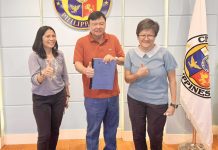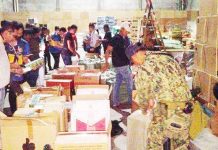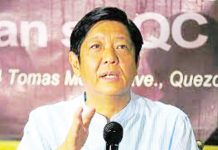
ONE OF the risks of having an interconnected world is that a serious concern in one part of the world can easily spread to another.
This certainly is the case with COVID-19, the new coronavirus strain. Given how fast it has spread, it was only a matter of time before local cases would appear, given the number of people who travel in and out of our country regularly.
However, it is certainly not the time to panic,
especially in the face of an overabundance of information, both accurate and
otherwise. It is best to let the Department of Health (DOH) be our primary
source for updates here in the Philippines, and the World Health Organization
for news everywhere else on the matter.
This is why recently, I advised the DOH to be transparent in reporting local
updates, and for the appropriate government agencies to assist in disseminating
information about local cases, safety precautions, and other related
information such as the use of social distancing, which are community
guidelines for social interaction.
I would have to say, too, that as the chairperson of the Senate Committee on Finance, all agencies involved in containing the disease should make known if they need any budgetary adjustments to pursue their efforts in minimizing the impact of the coronavirus.
Thankfully, there are funds in the 2020 General Appropriations Act that can be used. If these are not enough, then the DOH and other agencies must tell us immediately, so we can study how we can allocate more funds to this serious matter.
Thankfully, we have mechanisms in place that can streamline the process. The Mandatory reporting of Notifiable Diseases and Health Events of Public Health Concern Act, or Republic Act 11332 allows for the funds from other involved agencies, such as those for agricultural, veterinarians, environmental agencies, law enforcement entities, and transportation and communication agencies may be used to address issues related to the COVID-19 outbreak. The consultation for the law’s implementing rules and regulations are still ongoing. Hopefully, COVID-19 will speed up matters.
On PhilHealth’s side, Circular 2020-004, released on Feb. 10 this year, has specified that P14,000 will be released per individual — or patients under investigation (PUI) — as an added isolation package, and P4,000 for the initial management, stabilization, and proper transit of the patient to the referral hospital.
Alternatively, existing case rate packages, such as P32,000 for Adult Respiratory Distress Syndrome (ICD Code J80) and other applicable packages can be claimed instead of the isolation package. Furthermore, Cabinet Secretary Karlo Nograles recently gave assurances that PhilHealth will also cover the testing costs for COVID-19.
Such developments should be well-communicated, if only to get more people to have themselves tested. Any widespread effort to contain the virus would be for naught if ordinary citizens are themselves not transparent about their condition.
The COVID-19 coronavirus is, without a doubt, difficult to contain. With its long incubation period, and ability to make its host infectious without showing any symptoms, it can cause chaos not with its fatality rate, but mostly because of the potential for widespread infection before a coronavirus carrier finally becomes sick and is identified.
Even worse, it presents itself with symptoms that are
easily mistaken for the common cold, influenza, or pneumonia. It has the
potential to hit home for family-oriented Filipinos, as those most susceptible
to it are our elders, and those who have medical issues such as hypertension,
heart problems, and diabetes.
This outbreak presents the country with an opportunity to finally come up with
protocols for health events that can seriously affect our local communities,
and our economy. We should keep ourselves properly informed.
Now is not the time to lose our nerve and give in to
panic induced by too much information. What we should be doing now is
internalize health precautions that will protect us and make sure that our
loved ones will learn to be careful, too.
***
Sen. Sonny Angara has been in public service for 15 years — nine years as
Representative of the Lone District of Aurora, and six as senator. He has
authored and sponsored more than 200 laws. He recently won another term
in the Senate. (Email: sensonnyangara@yahoo.com| Facebook,
Twitter & Instagram: @sonnyangara)/PN





